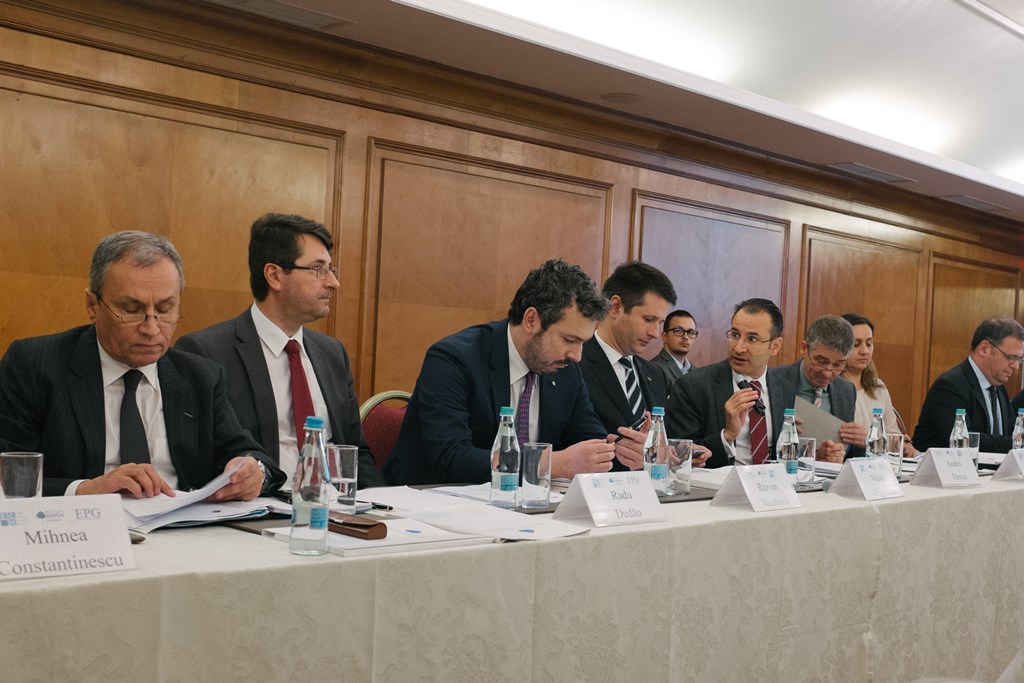Regional Energy Policy Cooperation in South-East Europe
Aspen Institute Romania in cooperation with the Centre for European Policy the Studies (CEPS) – Brussels and the Energy Policy Group organise the roundtable “Regional Energy Policy Cooperation in South-East Europe”. The event takes place on 8 December 2015 and focuses on the CEPS proposal regarding regional cooperation in South-Eastern Europe, infrastructure planning and energy security measures in the region, challenges to the Energy Union and national policies, transformation of the energy sector across the EU, including as regards the natural gas demand and investments needed in the field.
The starting point of the debate will be the ongoing drafting of a South East Europe energy roadmap by CEPS. The meeting will play an inclusive role in continuing a relevant and informed dialogue in the field and in facilitating Romanian contributions to the European debate on the future of the energy sector in South-Eastern Europe. Another important objective of the roundtable is to help identify key activities that CEPS can undertake in the future and to ensure a better participation of experts from South-East Europe in this exercise. Particular attention will paid to the development of the Energy Union and national policies regarding this initiative.
Other topics which will be discussed include opportunities and challenges for energy cooperation in South East Europe, as regards the transforming natural gas demand, the changing EU energy sector dynamics. Experts from Romania, Greece, Serbia, Bulgaria, Turkey and Croatia will present national perspectives.
Participants at this public policy dialogue include Romanian and foreign experts and policy-makers, representatives of the main think tanks working in the field, as well as of the business and NGO sectors.
The workshop is part of the Institute’s Aspen Energy, Security and Economy initiative aiming to contribute to the development of a regional Energy Platform.
The AIR Energy, Security & Economy Platform aims to provide an influential debate and reflection platform for regional business sector and decision-makers in the energy sector in the Black Sea – Caspian region and to create a trans-regional platform. The platform links the Caspian, Adriatic and Black Seas strategy and policy review (aiming to anchor the Western gate of the New Silk Road). This effort is designed to dovetail with the EU energy strategy as well as regional and global developments regarding energy markets, security and financing issues in the field. The Program offers a consistent and diversified platform of national expertise in the field, reuniting Aspen members, fellows, and professionals from a variety of backgrounds. Participants come from private, public and academia sectors. Through their input, contributors have the opportunity to shape up Romania’s policies and strategies.
In response to the need for a coherent and productive debate, benefiting from Romania’s valuable track record and performance in the energy field, the Aspen ESE Platform is designed to stimulate discussions and assist policy makers, energy companies and relevant authorities in reaching efficient results. This inclusive debate platform complemented by well-founded strategic analyses, considering the particularities of the energy sector, the economic effects and geopolitical implications.
Agenda
16:00 – 16:10 Introductory Remarks by Radu Dudău, Director, Energy Policy Group and Andrei Țărnea, Executive Director of Aspen Institute Romania
Keynote address by Victor Grigorescu, Minister of Energy of Romania
16:10 – 17:10 Session I. Energy Union: Opportunities and challenges for SEE Energy Cooperation
Chaired by Christian Egenhofer, Director at CEPS Energy Climate House and Julian Popov, Fellow at European Climate Foundation
16:10 – 16:20 Introduction to EU and SEE energy challenges, focus on the changing natural gas demand, the EU energy sector transformation and investment needs by Christian Egenhofer, Director at CEPS Energy Climate House and Julian Popov, Fellow at European Climate Foundation
16:20 – 17:00 Comments by:
Răzvan Nicolescu, Energy Executive Lead Advisor, Deloitte Central Europe (Romania)
Oktay Tanrisever, Middle East Technical University (Turkey)
Haris Boko, Chief Adviser, Hroje Pozar Energy Institute (Croatia)
Aleksandar Kovacevic, Senior Visiting Research Fellow, Oxford Institute for Energy Studies (Serbia)
Atanas Georgiev, Assistant Professor in the Faculty of Economics and Business Administration of Sofia University, (Bulgaria)
Tassos Chrysochoou, Ministry for Environment and Energy (Greece)
17:00 – 17:30 Discussion
17:30 – 18:30 Session II. Energy Union and national policies: What priorities for the way forward?
Chaired by Radu Dudău, Director, Energy Policy Group and Andrei Țărnea, Executive Director, Aspen Institute Romania
17:30 – 17:40 Presentation by Aspen Institute Romania and Energy Policy Group
17:40 – 17:50 Introducing the CEPS Policy Proposal for Regional cooperation in SEE, by Christian Egenhofer, Director at CEPS Energy Climate House and Anna Dimitrova, Research Assistant at CEPS Energy Climate House
17:50 – 18:00 Introduction on “No regrets cooperation measures: infrastructure planning and energy security” by Julian Popov, Fellow at European Climate Foundation
18:00 – 18:30 Discussion



